Pat Bertram's Blog, page 14
September 4, 2022
A Dream of the Future
I came across a Buddhist quote this morning: “Do not dwell on the past, do not dream of the future, concentrate the mind on the present moment.”
Normally I would agree that this is a good philosophy (one, moreover, that worked well for me while I was dealing with grief), especially since all we have is the present moment, an eternal now. Though come to think of it, I’m not sure that’s true. By the time you’ve said or thought “now,” that particular now — that moment — is already in the past. I suppose the secret is to forget “now.” To just be. Though I wouldn’t know either the truth of that or how to do it now that I’m identifying as a gardener. Or landscaper. Or whatever.
For example, this morning when I was out digging up Bermuda grass and other weedy vegetation, I also tried to figure out what else I need to do now to prepare for the garden I hope to have next spring. Prepare the ground, of course, to extend a grassy area into the garden area so I can more easily get to the back of the garden to take care of those distant plants. Decide what to plant in areas denuded by the removal of dead annuals, or perhaps decide not to plant and simply wait until next spring and see if any of those annuals reseed themselves. Also decide where to move plants that need to be divided, such as the New England aster, which are growing rapidly this year. (I started out with one stalk three years ago. It grew to seven stalks last year, so I divided them and thought I was set for another couple of years, but now each of those seven stalks has spawned at least an additional seven stalks.) Since the asters won’t divide and replant themselves, I have to decide where to put them.
Admittedly, this transplanting won’t need to happen for another month or so, but meantime, I need to get an idea of where to put them and to prepare the ground if they are to be planted in what are now uncultivated areas.
All of this takes planning because all of this takes a lot of work, and I have to pace myself to make sure I can do the work despite an aging body and diminishing reserves.
So, is planning part of the present moment? Obviously, one can only think in the present moment because you can’t think today’s thoughts yesterday or yesterday’s thoughts tomorrow, but all that planning is for the future.
And a garden is, almost by definition, a dream of the future.
Dwelling on the past is also something that is necessary when it comes to a garden. You have to pay attention to what thrived and what didn’t, what you did that you might not want to do again, what you didn’t do that you should have done. (I’m still trying to figure out what I could have done differently to keep swaths of my newly sodded lawn from dying, because until I can figure that out, any reseeded grass would surely end up with the same fate.)
There are, of course, those times in the garden that one does what one does — planting, weeding, watering — without thinking of . . . well, without thinking of anything. Much of gardening is mindless work where nothing exists beyond the work itself. So that part might live up to the Buddhist ideal, but the rest of it? Not so much.
It’s a good thing, then, that I’m not Buddhist.
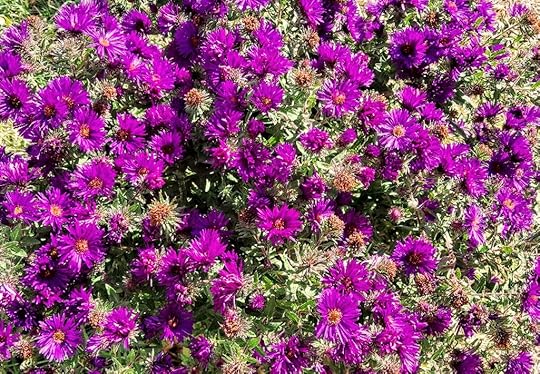
***
 Pat Bertram is the author of Grief: The Inside Story – A Guide to Surviving the Loss of a Loved One. “Grief: The Inside Story is perfect and that is not hyperbole! It is exactly what folk who are grieving need to read.” –Leesa Healy, RN, GDAS GDAT, Emotional/Mental Health Therapist & Educator.
Pat Bertram is the author of Grief: The Inside Story – A Guide to Surviving the Loss of a Loved One. “Grief: The Inside Story is perfect and that is not hyperbole! It is exactly what folk who are grieving need to read.” –Leesa Healy, RN, GDAS GDAT, Emotional/Mental Health Therapist & Educator.
September 3, 2022
Today’s Tarot Reading
Although I continue to do a brief tarot reading every morning for practice, the cards still don’t tell me much of anything. In fact, they generally seem too disjointed to tell any sort of story, whether mine or anyone else’s. Nor do I see a metaphor for my life in the cards, which is what some people believe a tarot reading is — a metaphor for the querant’s life. The querant, for those who don’t know anything about the tarot, is the person seeking answers. In my case, I am both the reader and the querant, so perhaps I’m too close to the querant’s situation to make sense of the cards.
Unlike most people, I don’t ask the cards specific questions; I stick with a generic, “What do I need to know today?”
Apparently, since I don’t glean anything more specific than bad things happened or will happen, or good things happened or will happen, I don’t need to know anything else. But then, that’s pretty much life, isn’t it? Those good and bad things that happened or will happen don’t need to be anything earthshaking because except for a few truly earthshaking moments — births, love, death — most of life is about small happenings.
I suppose I could change my question to see if I get any other sort of result with a different query, but the truth is, I don’t really need the cards for answers to life’s questions. I don’t seek insights into the past because the past is done with. I don’t care to know what will happen in the future because if I live long enough — a day, week, year, whatever — I will experience the future firsthand. I don’t need a metaphor for my life because I am living my life, metaphor or no. I certainly don’t rely on the cards to give me investment advice or anything like that because . . . well, for one thing, I have no funds to invest, and for another, if I have to rely on myself to interpret the cards, I might as well rely on myself to interpret the various investment possibilities.
Still, it’s possible that someday a certain tarot deck, the preponderance of my readings, a greater understanding will all click, and then I will know . . . something.
Meantime, there is my daily practice.
Despite my earlier declaration that the cards generally don’t tell a story, today’s three-card reading did, at least to an extent. The first card, the four of swords tells what happened in the past. (After facing multiple crises, you needed time for solitude and getting ready to face new challenges). The second card, the ten of swords, hints at the results of that past. (Pain, loss, desolation, but in that darkness are the seeds of hope.) The third card, the four of wands, suggests what will happen next or what actions will need to be taken. (Country life, work/life balance, peace, a sense that our projects are a wider expression of who we are.)
Did this reading change anything about my life or tell me anything I didn’t know? Well, no, but it did give me a blog topic, and that’s not a small thing.
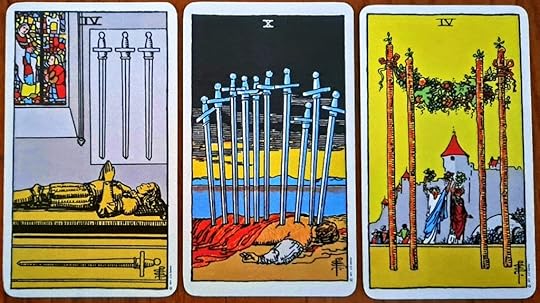
***

Pat Bertram is the author of Grief: The Inside Story – A Guide to Surviving the Loss of a Loved One. “Grief: The Inside Story is perfect and that is not hyperbole! It is exactly what folk who are grieving need to read.” –Leesa Healy, RN, GDAS GDAT, Emotional/Mental Health Therapist & Educator.
September 2, 2022
What’s to Come
We had a lot of rain Wednesday night, so yesterday morning I took the opportunity to start clearing out some flower beds in preparation for fall and winter. The lilac garden particularly needed work because the tomato plants I’d planted in the large space in front of the bushes went wild and completely buried the still-small lilac bushes. I trimmed back the cherry tomato plants, and then spent an hour or so untangling the bindweed from the lilacs, which I hadn’t been able to do because of the tomato forest.
Surprisingly, despite the neglect and competition, the lilacs are all doing well. I’d planned to plant the tomatoes in my raised garden next year, but now I’m thinking I will plant cherry tomatoes in pots to keep them from taking over the flower beds. Better yet, considering the long, ropy branches, maybe I’ll plant them in hanging pots.
This morning, the ground was still damp enough that I decided to continue my pre-fall cleanup. I hadn’t been able to get to my lilies to weed them because of all the wildflowers that grew in that area, but with most of the flowers spent, I was able to do a lot of clean up — pulling weeds, weedy grasses, and of course, the dying wildflowers.
I need to get grass seed to fill in the spots in the lawn that seem to be dead. There should be plenty of seed left to extend the lawn into the flower bed so that it will be easier to get to the lilies. Since that area is toward the back of the yard, I won’t mind as much if the weedy grasses encroach on the expensive grass — either way, I will be able to mow the area, making it easier to work that flower bed. (And end up with a few fewer feet of ground to weed!)
As I water and weed, I spend a lot of time looking at the garden, trying to figure out what works best for me and what doesn’t, and from a weed-pulling standpoint, I enjoy the bushy flowers like echinacea more than the single-stemmed varieties because they don’t seem to get as weedy as other plants. I must admit, though, that I did enjoy the wildflower gardens and the ever-changing blooms. My problem with the wildflowers was the difficulty in weeding as well as trying to control the foxtail grass that seemed to grow even better than the wildflowers, so perhaps the wildflowers would be best in the raised garden.
And oh, the wild four o’clocks. They never did well, never got the mounds of flowers they were supposed to, but I just found out they didn’t need to be watered much. I was going to move them to a place where they wouldn’t get watered when I watered my grass, but apparently, they don’t do well as a transplant. Considering that the plant went dormant for a couple of years, I’m not sure it’s something to worry about.
I also don’t think I’ll have to worry about planting more Love Lies Bleeding amaranth — apparently, it readily seeds itself. I like it, at least sometimes, when the garden itself decides what to grow. It saves me a lot of trouble.
I’d also considered not planting more moonflowers, but they do well here, and since it’s next to the fence, and since my neighbor likes it, it seems a good thing to replant, though it, too, might reseed itself, saving me the trouble. (Though, truly, it was no trouble at all to throw a few seeds on the ground and give them a bit of water.)
I realize there’s nothing particularly interesting in this post. It’s mainly for me, reminders of what’s to come in future seasons and what I need to do to ensure that coming.
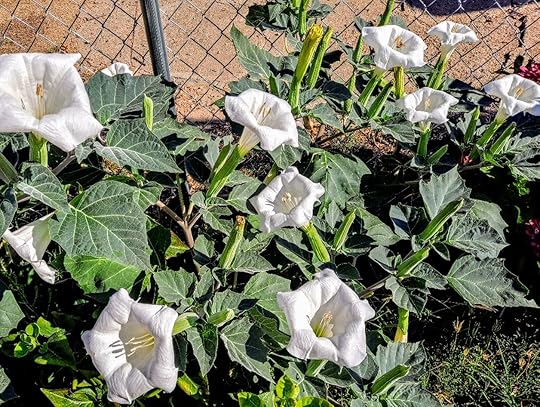
***

What if God decided S/He didn’t like how the world turned out, and turned it over to a development company from the planet Xerxes for re-creation? Would you survive? Could you survive?
A fun book for not-so-fun times.
Click here to buy Bob, The Right Hand of God.
September 1, 2022
Playing the Hand I’ve Been Dealt
I do really well most of the time playing the hand I’ve been dealt in life.
Did I really use a game metaphor? Apparently, it’s not just gardening I see as a game, but life itself. This isn’t my conscious view of life — life has thrown too many tragedies and tragic consequences my way for it to classified with amusements such as card games or ball games or even gardening — but it does seem at times as if fate is willy-nilly dealing out experiences. Wealth to this person, beauty to that one, grief to another. Admittedly, at some point most people deal with grief, as if it’s a wild card that can fill out any hand, but still, I don’t think life is a game with distinct winners and losers. Nor is life playful or amusing as games should be — it’s generally too serious. (Though people who do manage to deal with life’s vicissitudes in a playful manner — people who believing the underlying energy of the universe is that of a child at play — find that things go their way more often than not.)
But all that is by way of an aside. I really came here to write about a moment I experienced last night. As I said, I do really well most of the time playing the hand that life and death (not my death, obviously, but the death of various loved ones) has dealt me. In fact, the cards I am holding at the moment are great ones — a comfortable home, a yard to get creative with, someone to call when I have a house emergency, a job that pays for such trivialities as groceries, good friends.
And yet, there are those moments . . .
Last night I went into my bedroom to turn down the covers in preparation for sleep, when suddenly I was hit with a vast wave of loneliness. I have no idea where it came from or why it chose that particular moment to engulf me, but there it was, stopping me in my tracks.
I let that devastating moment pass through me, though a faint sense of being alone lingered as I finished my task.
That’s all there was to it — just that moment. It wasn’t enough to send me spiraling into grief, but it was enough to temporarily overwhelm me.
And it was enough to make me take stock and realize that after all I’ve been through the last decade or so, I really am lucky to be doing as well as I am.
[image error]Pexels.com" data-medium-file="https://ptbertram.files.wordpress.com..." data-large-file="https://ptbertram.files.wordpress.com..." src="https://ptbertram.files.wordpress.com..." alt="" class="wp-image-18217" width="600" srcset="https://ptbertram.files.wordpress.com... 1024w, https://ptbertram.files.wordpress.com... 150w, https://ptbertram.files.wordpress.com... 300w, https://ptbertram.files.wordpress.com... 768w, https://ptbertram.files.wordpress.com... 1880w" sizes="(max-width: 1024px) 100vw, 1024px" />***

Pat Bertram is the author of Grief: The Inside Story – A Guide to Surviving the Loss of a Loved One. “Grief: The Inside Story is perfect and that is not hyperbole! It is exactly what folk who are grieving need to read.” –Leesa Healy, RN, GDAS GDAT, Emotional/Mental Health Therapist & Educator.
August 31, 2022
Thinking Things into Futility
I’ve spent an interesting hour or so online looking for a word to describe one who tends to think things into futility. I started with “fatalist,” which sounds like it should be a word for a “futilist,” but only the end result of the philosophy is the same. Fatalists believe all is fated, all is destined to happen, which can leave them feeling resigned about life since they believe they are powerless to change anything, and in the end, that powerless can lead to feelings of life being futile.
Fatalism led me to nihilism, because apparently, the two are intertwined on the internet if nowhere else.
Nihilists believe there is no underlying grand meaning (or grand being) behind life and human existence, and that belief, too, can lead to feeling of life being futile since many nihilists believe that in the absence of inherent meaning, human existence has no particular value.
So although both fatalism and nihilism can lead to a feeling of futility, they start from completely different points of view.
Mostly, a search for a name for someone who tends to think things into futility led me to a plethora of mental health sites, as if a person who tends to think about meaning and meaninglessness has a mental health issue when in fact, such people (according to a different plethora of sites) tend to be intelligent and realistic.
The best thing I found about a person thinking things into futility is a quote from Alan Watts, a writer and speaker who translated Asian wisdom into plain English. He said, “A person who thinks all the time has nothing to think about except thoughts. So, he loses touch with reality and lives in a world of illusions.”
He makes an interesting point, though I’m not sure if it fits the premise I’m developing for this blog post. In my case, I tend to think that by thinking about thoughts, I get pulled out of the world of illusions, and that by not thinking, I am lulled into a world of illusion.
But this isn’t supposed to be an essay about illusion; it’s about my tendency toward “futilism”.
I’ve recently mentioned that I’ve been trying to look at gardening as a game, which helps me keep on doing the best I can with my yard, otherwise, I tend to think to much about what I am doing, and the work begins to seem futile. Which, in the grand scheme of things, it is . . . futile, I mean. A hundred years from now (heck ten years from now!) who will even care? The land will be here no matter what is on it and how much work was done.
Even on a daily basis, gardening seems futile (if I think about it). Life so often does what it wants. Some plants that shouldn’t live in this climate do well; others that should do well don’t. Sometimes watering is the right thing; sometimes, it isn’t. Which means, that if I want to keep up with my yard, to continue my creative endeavors on such a large scale, I have to stop thinking so much about what I am doing and why I am doing it, and just play the “game.” Thinking about what works and doesn’t work in the garden — strategy — is all part of the game. Wondering about the purpose of it all is not part of the game, and in fact, is an unnecessary complication because a game is its own reason for being.
This tendency of mine to think things into futility is not just about gardening, but about almost anything. To keep up with this blog and to write a blog post a day, I have to focus on what I am going to say and then say it, because when I start thinking too much about what I am doing here on this blog and why I’m doing it — other than as a writing discipline — the concept of blogging turns to dust in my hands, and it seems futile to continue.
I read the same way I breathe — I just do it without thinking. But when an author makes a serious mistake, it thrusts me out of the story and makes me think, which is not a good thing. In the book I just started reading, for example, the character got a phone call from a call box, the last old-fashioned coin-operated phone left in town. Okay, as unrealistic as that may be, I can accept it. But when the author goes on to explain that the phone booth is outside the drugstore, in the alley by the dumpster — that did me in. For decades that phone has been hanging on a wall in an alley, and no one ever vandalized it? How am I supposed to believe that? So, since there can’t be a phone, there can’t be a call, and if there can’t be a call, there can be no story and continuing to read the book becomes futile.
Yep — thinking my way into futility again.
It does make me wonder, though: if “not thinking” seems to give me a sense of meaningfulness and “thinking” seems to give me a sense of meaninglessness, of futility, what does that say about me? Or thinking? Or meaning? Or anything, for that matter.
Hmmm. I think I just proved my point.

***

What if God decided S/He didn’t like how the world turned out, and turned it over to a development company from the planet Xerxes for re-creation? Would you survive? Could you survive?
A fun book for not-so-fun times.
Click here to buy Bob, The Right Hand of God.
August 30, 2022
An Instrument of Anarchy
Everything that slows us down and forces patience, everything that sets us back into the slow circles of nature, is a help. Gardening is an instrument of grace. ~ May Sarton
A friend sent above quote to me today. It’s a lovely sentiment — gardening as an instrument of grace — and I do agree with it. To an extent. And that extent is where the ruthlessness begins.
To be honest, I’m not ruthless enough to be a good gardener, but I am learning to be heartless when necessary, or rather, I should say I am trying to learn, though it’s hard. I really do prefer to think of my garden as a place of peace — and grace — but I am committing enough atrocities in even in the most innocent-looking of my garden spaces to satisfy a whole slew of criminals and mystery writers.
For example, the other day, I hacked a few plants almost to death to protect a few shy plants from being choked into extinction by those more aggressive organisms. I beheaded a few plants — cut off the spent flowers — and justified my actions by telling the poor headless plants the decapitation would encourage more flowers to bloom. I tried poisoning some plants that resisted any other of my attempts at controlling their behavior, but those plants have such strong constitutions they even resisted the poison. I’ve murdered weeds, kidnapped baby plants from the mama plants to give the mama room to grow, and even worse, I was so callous, I did not even hear her cries of distress. I’ve stolen the fruits of some plants — admittedly, that’s what I grew the tomato and cucumber plants for, but that does not mitigate the cruelty to the poor plants.
You’d think with all that mayhem (deliberately maiming a living organism) and herbicide (deliberately causing the death of a plant in the same way that homicide is the deliberate act of causing the death of a person), my plants would behave, turning my various gardens places into places of law and order. I suppose they are places of law — the law of nature — but they are rapidly losing any sense of order. Not only do I lack whatever authority or criminal tendencies might be necessary, I also lack the energy and strength to whack my garden spaces into submission, so the plants — flowers and weeds alike — do whatever they wish.
Apparently, for me, rather than gardening being an instrument of grace, it has become more of an instrument of anarchy.
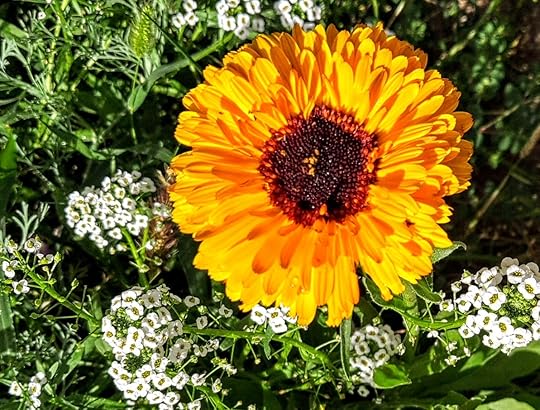
***

What if God decided S/He didn’t like how the world turned out, and turned it over to a development company from the planet Xerxes for re-creation? Would you survive? Could you survive?
A fun book for not-so-fun times.
Click here to buy Bob, The Right Hand of God.
August 29, 2022
Gardening Game
I’d just decided that gardening is simply a game I am playing so there’s no need for me to fuss about anything that grows or doesn’t grow, when I went out to work on the yard and was greeted with several unpleasantnesses: more stinkhorn mushrooms and eggs, a mess of cat diarrhea, a scourge of spurge, and tarantula wasps. I suppose I should consider these things part of the game, because a game is not a game if there are no challenges to overcome. On the other hand, a game is something you do for amusement, and my “challenges” today were far from amusing.
The tarantula wasp, a two-inch monstrosity, isn’t really unpleasant . . . unless you’re a tarantula, that is. The wasp seems to have little interest in humans — at least not this human — so they don’t pose a threat. Seeing the wasp, though, reminded me that despite a return to temperatures in the nineties, fall really is coming. And it reminds me to see if I can find any tarantulas as they begin their wandering to find a mate. Although this area is known for the so-called tarantula migration, the past couple of years these arachnids have been scarce. Perhaps this year things will be different. Other things sure were different (plants that grew enormously, for example, and weeds that moved into new territories), so why not the tarantulas?
If gardening is a game (though it seems to be more of a creative endeavor than a true game), then any wins come from the good things one finds in the garden, and today there were some beauties. A monarch butterfly that flitted about so much I couldn’t get a picture, a yellow coreopsis, a cucumber, sunflowers, and amaranth.
I wasn’t sure if I liked this foxtail amaranth, but it is growing well as well as growing on me (euphemistically speaking), so I might get some more seeds for next year. (They were in a packet of wildflower seeds, most of which didn’t grow perhaps because the seeds were old, so that makes me even more impressed with the amaranth.)
There really isn’t a score to keep in this gardening game, but if there were, taking into consideration the unpleasantness situations as well as the pleasantness ones, I’d have to call today a draw.
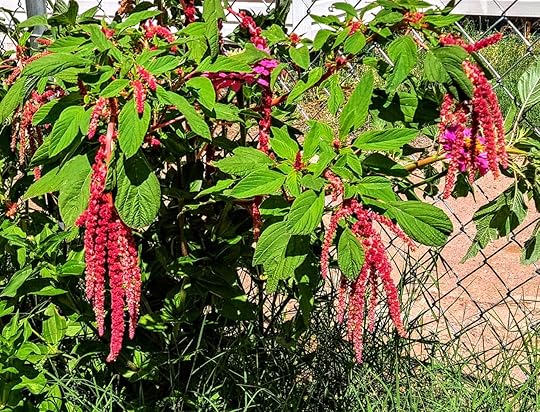
***

What if God decided S/He didn’t like how the world turned out, and turned it over to a development company from the planet Xerxes for re-creation? Would you survive? Could you survive?
A fun book for not-so-fun times.
Click here to buy Bob, The Right Hand of God.
August 28, 2022
Live and Let Live?
If I gleaned another pithy life lesson from my garden today — which I didn’t — it for sure would not be “live and let live.” It’s a good sentiment, and one I would love to follow, but certain garden aggressors, not just weeds, tend to turn the adage too much to their advantage, overshadowing and choking out shyer plants. I do understand aggression is the way of the world, especially in a garden, but that doesn’t mean I have to like it. Nor do I have to like getting aggressive myself, but sometimes it’s necessary to become destructive in order to give less aggressive plants a chance.
Today was my day to try to control some of the aggressors that are way too successful at growing beyond their allotted boundaries. As I mentioned before, I got so tired of battling the Bermuda grass all summer that I broke my no-chemical resolve and purchased an herbicide a couple of weeks ago that’s supposed to control Bermuda grass. The first application didn’t do anything, nor did the second, so I sprayed again today. I’m keeping my fingers crossed that the herbicide will work this time, though I have no real hope of it doing so. Belatedly, I read the FAQs, and found out that this product might take up to seven applications, which means to me that using the stuff is an expensive ploy to make them money and give me something to do while I wait until the weedy grass goes dormant for the year.
I also hacked off some of the far-reaching branches of my tomatillo plant. I wasn’t particularly interested in growing tomatillos, but I was gifted with a seedling, so I stuck it in a bare spot in my garden. Until I pruned the plant, it seemed to have taken over the entire area. It completely buried my violets, and it smothered my chrysanthemums just when the mums are starting to bud and need to see the sun. The tomatillo plant had grown so big that even after my hatchet job, most of the plant is still there, so hopefully all I did with my destruction was restore a bit of balance.
At the beginning of mosquito season, I’d sprayed my yard with a repellant, but it seems to have worn off because my arms are now decorated with several hugely swollen areas where the bugs feasted. Of course, if I had worn my magic anti-mosquito shirt, I would still be itch-free, but I didn’t bother to put on the shirt before stepping outside for just a minute early yesterday, and now I am paying for my lapse. (There really is such a thing as a mosquito repellant shirt. You can buy them, or you can buy permethrin and make your own, which is what I do.)
Because of all that, I should have also sprayed my yard with a mosquito repellant today, but after dealing with the herbicide, I didn’t want to inundate the place with yet another chemical, so maybe I’ll do it another day.
Live and let live? Apparently not.

***
Pat Bertram is the author of intriguing fiction and insightful works of grief.
August 27, 2022
Before and After
Lately I’ve been seeing a lot of before and after pictures in advertisements for diet aids that will melt away the fat practically overnight. This sort of ad has been around my whole life, but now they seem extreme. The before picture is always a very large ordinary-looking person, and the after picture is a skinny, sloe-eyed sexy creature dressed to advertise (apparently) their new wares.
There are so many things wrong with these ads, that I have a hard time finding any the truth in what I am seeing. It seems impossible that a single gummy supplement taken every night would get rid of so much fat so quickly. I can understand wanting to lose weight, wanting to show off one’s new figure and lifestyle, but it seems impossible that beneath every hefty woman is a streetwalker (movie-version) waiting to get out.
Even more, it seems impossible that anyone who drops a lot of weight that quickly doesn’t have skin issues. I remember reading an expose once about an obese woman who fell for such an ad, though from what I remember, the ad she fell for was for bariatric surgery. She did lose the fat, but not the excess skin. Rolls and rolls of skin remained (perhaps ten pounds worth) that she had to tuck under ace bandages and girdles and shapewear. Although her insurance company paid for the initial surgery, they refused to pay for body sculpting surgery to remove the excess skin because they deemed all those folds not life threatening. But apparently, when one takes a “keto” gummy, the skin adjusts immediately.
Or maybe the before and after photos are of different people? Sometimes it seems so, though I suppose it’s possible that extreme weight loss can also affect the bone structure as well as the muscle composition and distribution.
If the before and after photos from the ads are of the same people, how did they get to be part of the ad? Were they chosen beforehand by the ad agency? Or did they choose themselves simply by taking the before photo, and then, when things worked out as the ad said, took the after photo and submitted them to . . . well, whoever they submitted them to.
I suppose it is possible that some people can lose huge amounts of weight with only those gummies and no change to diet or activity, can completely change their look and demeanor, can shrink their skin while the fat melts away. I even suppose it’s possible that all those people were so convinced of the efficacy of the pills that not only did they take a before picture, but they saved their fat clothes to dress up in for the after photo. Well, one of the after photos. The main after photo is always the pseudo sexy one.
All that is just nitpicking. My real question about all of this, the question that prompted this post, is what about all those women who took the before photo with such hope (and a tinge of desperation), paid the extortion rates for the gummies, ingested them as directed, but nothing happened.
On second thought, maybe I don’t want to know. I’ve dealt with my own diet failures too often to want to dwell on the subject, but apparently, since the question niggles at me, the subject wants to dwell on me.
On a lighter note: the first New England aster bloomed today. Apparently, it’s been cool enough the plant thinks (to the extent a plant can think) that it’s fall.
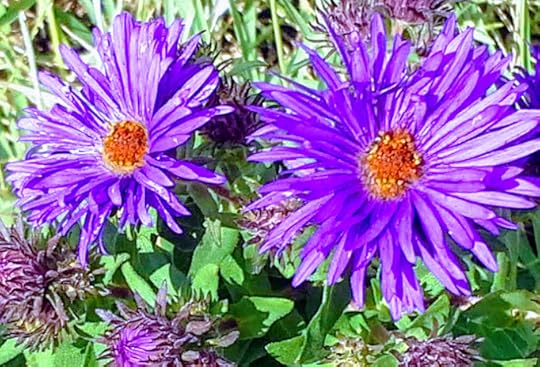
***

What if God decided S/He didn’t like how the world turned out, and turned it over to a development company from the planet Xerxes for re-creation? Would you survive? Could you survive?
A fun book for not-so-fun times.
Click here to buy Bob, The Right Hand of God.
August 26, 2022
All I Know
The title of this piece is rather a misnomer because all I know are the things I think I know, and I have learned not to trust everything I think.
Still, as a thinking, working, writing entity, I have often written about things I have learned from grief and from life. Most recently, I’ve been mentioning lessons I learned from gardening, such as:
You get what you get and what you get is not always what you deserve.If you’ve done everything you know how to do to change things, then you have no other recourse except to accept what is.Take care of that which you can, and if things grow out of your control, do the best you can with that, tooBe patient.Don’t be intimidated.Some things live, and some things die.Focus on the details, but also look at the big picture.Be adaptable. (This is one I have not spoken of specifically, but all of my gardening posts intimate the importance of adaptability.)Those “learning” posts reminded me of a book I once read called All I Really Need to Know I Learned in Kindergarten. The author listed such things as: learn some and think some, draw and paint and sing and dance, and be aware of wonder. Those are good things to know, too, but I don’t remember learning them in kindergarten. To be honest, that was so long ago, I have only the vaguest notion of even going to kindergarten.
I do remember my first day of first grade, however. I hung my blue nubby jacket with a multicolor tiny-checked lining in the cloak closet — as it was called back then, even though no one even knew what a cloak was — then I sat down. To my horror, I discovered I was in the wrong classroom, and I bolted out of there. I have no idea how I got my coat back; all I know is that I was too embarrassed to retrieve it. So I suppose I could add this pithy bit from the first grade to these lists of “all I know”: Mistakes happen; deal with them . . . or don’t.
When I came online today to jot down my thoughts about all I know, the first thing that greeted me was the saying: “When it comes down to it, the only knowledge that really matters is how to purify water, how to grow your own food, how to cook, how to build, and how to love.”
So that’s something else to add to what I know — not how to purify water, which incidentally, I do know how to do; not how to grow food, which I know hypothetically; not how to build because it’s too late in the game for me to learn, though again, I know the basics hypothetically because I’ve watched a lot of building going on around here; and not how to love, though I do know that, or at least, I once did — but that the internet can read minds.
A final note on things I know — although it’s not something I know or even believe, I do take comfort in times from a line in the Desiderata: “And whether or not it is clear to you, no doubt the universe is unfolding as it should.”
Looking over this post, it seems as if what I’ve written today can be summed it up with a simple credo: “It’s life. Live it the best way you can.”
O even more simply, “Live.”
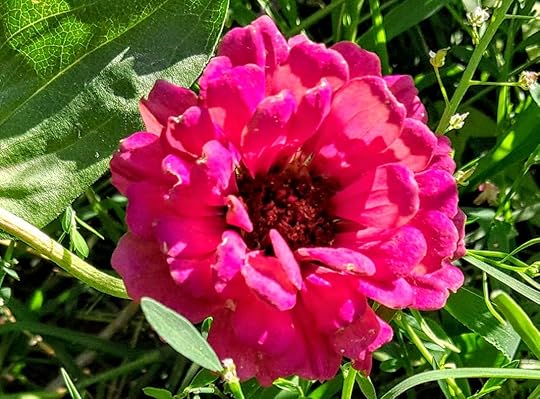
***

Pat Bertram is the author of Grief: The Inside Story – A Guide to Surviving the Loss of a Loved One. “Grief: The Inside Story is perfect and that is not hyperbole! It is exactly what folk who are grieving need to read.” –Leesa Healy, RN, GDAS GDAT, Emotional/Mental Health Therapist & Educator.



